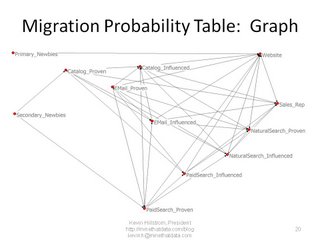Proven And Influenced Advertising Channels
 There are two types of advertising channels in the Multichannel Forensics framework.
There are two types of advertising channels in the Multichannel Forensics framework.- Proven Channels
- Influenced Channels
Oh, those were heady times.
These days, everybody is obsessed with fractionally allocating orders based on the advertising channels that they perceive to be driving orders. First touch? Last touch? Allocation across touches.
Of course, all of the allocation rules are bogus. We don't really know, do we? Especially if we don't do mail/holdout groups, and you really cannot do mail/holdout groups for paid search (though you can do some innovative spend/no-spend strategies).
So why the obsession with first touch, last touch, and fractional allocation? The end result is clouded with fiction, anyway.
There's another way to approach this challenge. Instead of investing all of our efforts on the art of allocation, why not categorize orders based on proven and influenced sources, then track how customers evolve over time --- allowing us to reduce catalog or e-mail marketing expense in the future?
Let's say that you have three advertising channels that resulted in an order:
- Catalog received on June 1.
- E-Mail received on June 3.
- Order on June 5, using Pay-Per-Click.
Here's the marketing analytics secret for you --- shhhhhh, don't tell anybody!
- When catalogs and/or e-mails move from "proven" to "influenced" advertising sources, you don't have to send as many of these to the customers using them as "influenced sources" in the future --- once customers move away from these advertising channels as their primary reason for purchasing, they become less likely to use them in the future.
This is where Multichannel Forensics, and micro-channels in particular, make a big difference.
Labels: First Touch, Fractional Allocation, Influenced Source, Last Touch, Micro-Channels, Proven Source
5 Comments:
I will recommend using ePostMailer for all bulk email marketing needs. Its the best bulk email marketing software I have used so far.
was paid search truly the proven touch? if someone received an email and a catalog, and this prompted them to do a branded search, and they just clicked on the top real estate of a search engine result page, wouldn't the sale probably have happened without the paid search ad? the same can't be said for the catalog or email.
Sure, you could say that the catalog or the e-mail drove the order, but now what? Was it the catalog or the e-mail that is proven to drive the order.
So you could call all three advertising channels "influencers".
The answer is that there isn't a right or wrong answer. Everybody has a bias as to what they believe drove the order. Three people could look at this order, and come up with three different proven and influencing channels.
That's why the article advocates looking at what the customer does "next" --- in the "next" order, the customer might buy via the website, or might buy via e-mail --- whatever --- the thing is, looking at the next order allows you to see what the trend is likely to be, and knowing that trend, you can reduce or increase catalog/e-mail marketing contacts.
The last portion of the last sentence is what matters most.
excellent article :
I will make my comment a story :D
Lets assume that I got a catalog from Apple store at 1:00 p.m about the new Apple macbook.
Then I got an email about the new Apple macbook but because I was at work I did not go through it.
Then while I was watching my favorite TV show , an ad for Apple new macbook just came in a the middle of it :(.
Then at 11:00 p.m I went to google.com and typed "Apple new macbook" ,I clicked on the first page and went thought all process and ordered the new apple macbook.
Now lets specify Channels based on this example :
1-Proven channels : "Google search (Brand name)"
2-Influenced Channels : are
-Catalog
-Email
-TV Campaign
But this is not 100% accurate
Content,type of offer and price should not be the same in all channels
I should receive a different content,price or discount for the same product from each channel so when I make my order It will be easier to track which channel really got the order.
Sure, no arguments there!
Post a Comment
Links to this post:
Create a Link
<< Home